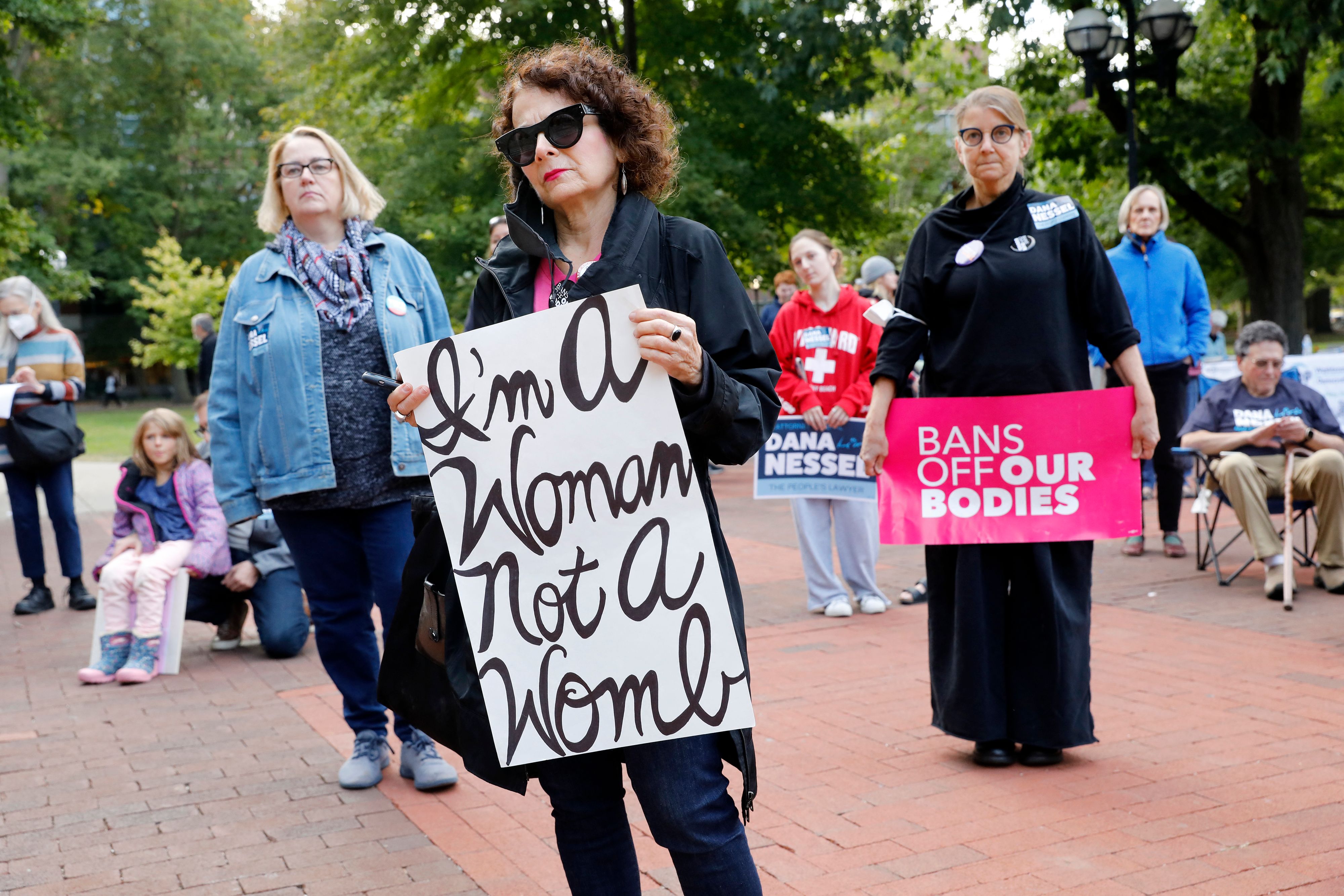Top Democratic pollster says outrage about abortion has not faded
Democratic pollster Zac McCrary speaks with Eric Garcia about tracking Trump voters, the Dobbs effect and how Democrats can fix their problem with Latino voters


Like almost everything else in politics, the practice of polling has become, well, polarised. Many pollsters missed former president Donald Trump’s strength in 2016 and in 2020. Similarly, many political analysts have cautioned that polling might miss Republican voters, while Democrats have worried about Republicans improving in polls after the Supreme Court overturned Roe v Wade this summer.
With this in mind, The Independent is speaking with pollsters and political operatives across the political spectrum to see what they have to say about tracing the American electorate.
Zac McCrary is a partner at Democratic firm Impact Research, which conducted polling for President Joe Biden, though he was not involved in the 2020 campaign polling. He also conducted polling for Louisiana Governor John Bel Edwards, Nevada Governor Steve Sisolak and various House and Senate campaigns throughout the years.
“I don’t think there’s sort of the one simple trick to fix polling, the one simple trick to find Trump voters,” he told The Independent. “But I think the hope is that utilising several different methods that each of them nudge our samples and nudge our data a little closer to replicating the actual electorate, which I think legitimately has been light and has been missing under counting a very particular type of Trump voter.”
Specifically, he said that polls missed Trump voters based in staunchly Republican areas and more rural communities.
“Even if you’re getting the right number of Trump voters, if you’re not getting sort of a particular flavour of Trump voter, even that in itself can be a factor,” he said. As a result, Mr McCrary said his firm is keeping an eye on how they self-reported in a previous election.
“That’s not the end-all be-all to it by any means, but if you’re polling in Georgia and we all know that Georgia was pretty much 50/50 Biden-Trump in 2020,” he said. “If you’re getting a sample and your sample is reporting that it’s plus six Biden, then that’s an issue. Then clearly you are most likely missing something.”
In addition, Mr McCrary said that they are trying to make conservative assumptions about the electorate, noting how in Ohio’s 1st Congressional District that voted for Mr Biden by 8.5 points. But he said for this year, “Our 2020 recall is assuming that of the electorate who will turn out this November it’s plus four Biden.”

“So that’s intentionally being conservative, intentionally trying to err on the side of being attentive and sensitive to the idea of not being light on Trump voters,” he said. “And honestly hopefully that if anything we’re being light on Biden voters.”
The last element that he said was being sensitive to how much voters care about politics.
“Now clearly the people that are missed tended to be more Trump oriented, so we’re trying to cap the number of interviews we get with people who say that politics is very important to them, cap those interviews, weight up the interviews, over-represent the interviews of people who say politics isn’t that important to them.”
Conversely, many Democrats have fretted about the fact that Republicans have taken the lead in the generic ballot, which determines whether voters would vote for a Democrat or Republican, as of late. A Monmouth University poll released Thursday showed Republicans had a four-point lead over Democrats in terms of who voters would prefer to control Congress. In addition, a New York Times/Siena College poll showed that 49 per cent of voters preferred Republicans to Democrats, which was a change from the previous month.
That is a reversal in fortune from the summer when preference moved toward the Democrats after the Supreme Court overturned Roe v Wade in Dobbs v Jackson Women’s Health Organization.
But Mr McCrary said that the Dobbs effect has not tapered off and some people forget how dire polling looked for Democrats before Dobbs and Mr Biden’s numbers nosedived into the 30s.
“And I think it’s not only Dobbs, but I think Dobbs did a lot to help build back the Democratic support, build back a foundation of support among Democrats that put Democrats in a much more competitive place than they were previous to that, or really than Democrats should be by most of the fundamentals,” he said.
Mr McCrary said that midterms are usually about fundamentals and noted that Mr Biden’s approval rating, while improved, is still underwater.
“That’s not purely [a] reflection of voters’ views toward Democrats, but Democrats are running the show so Democrats are going to be on the business end of the frustration that voters feel on that,” he said. “And I think that has gotten lost a little bit in the shuffle as Democrats have had a really strong, perceived to have had a strong few months here in the summer.
So I do think Dobbs has done a good bit to help Democrats close the gap, engage Democratic enthusiasm.”
But the enthusiasm isn’t uniform. In 2020, Mr Trump made inroads with many Latino voters and the GOP is hoping to improve those margins, including in Nevada, where Mr Sisolak is running for re-election, as is Senator Catherine Cortez Masto, the only Latina senator in history. In the past, many polls have missed Latino voters–particularly in Nevada, something Mr McCrary said pollsters are trying to remedy.
“So I would say generally in our data and in a lot of the other data I’ve seen the really alarming Latino numbers seem to be coming out of surveys where you have small, noisy samples of Latino voters that are just not prioritizing getting the most robust read they can,” he said. “But I would say even when we are engaging larger sample sizes and going the extra step, two, or three to make sure we’re getting as clean a read on Latino voters as we can in Nevada or elsewhere, we’re seeing I think a lot of times less alarming numbers than some of those really noisy small sample sizes.”
Still, he said that Democrats are seeing some trouble with Latino voters that they did not see in 2018 in Nevada and elsewhere.
“It’s not as dire as, hey, Republicans are about to sweep Latinos, which, you look at least some of the state by state numbers or whatever, you might come to that conclusion, but seeing Democrats not matching their 2018 numbers as well,” he said, adding that out in the field, the picture is not as dire for Democrats, but still not in the place they were in 2018.
“We see that we’re in the low fifties this cycle in polling, and maybe the 2018 cycle we were in the mid or high fifties,” he said. “Things like that where there is this somewhat of a gap, but I think a gap that campaigns have to prioritize and have to believe can be made up with real investment in messaging. So I think those are the pieces that we’re seeing.”
Join our commenting forum
Join thought-provoking conversations, follow other Independent readers and see their replies
Comments


Bookmark popover
Removed from bookmarks